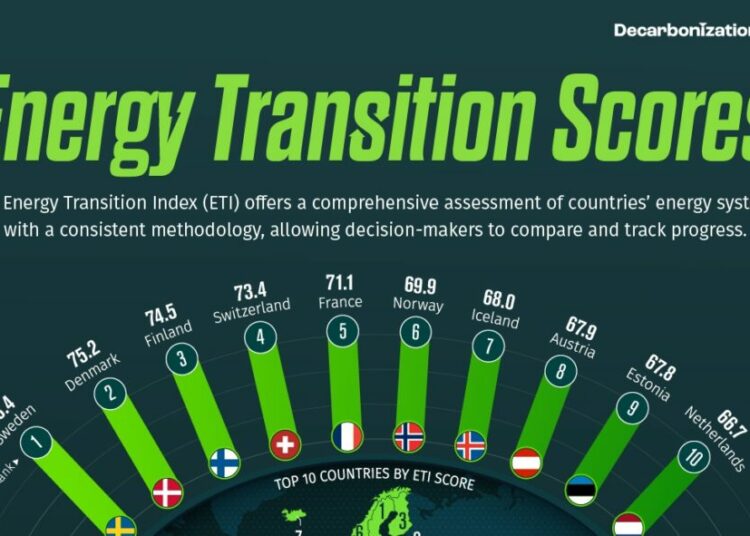In a recent study, Nigeria scored 54.8 points, to move to 61st position worldwide in energy transition showing the strongest improvement among African nations.
The country has climbed 48 places since the 2024 index, driven by targeted regulatory reforms, growing investment in clean energy, and localized transition strategies.
Nigeria is thus Africa’s top performer in energy transition for 2025, according to the latest global rankings released on June 18 by the World Economic Forum (WEF). The report, developed in partnership with consulting firm Accenture, is based on the Energy Transition Index (ETI) 2025.
It measures energy system performance across 118 countries, using 43 indicators grouped into three key areas: security, sustainability, and equity, along with five readiness factors for energy transition including regulation, financing, innovation, infrastructure, and human capital.
Countries are selected based on the availability of consistent data across a minimum set of indicators.
Each nation receives a score from 0 to 100 for every indicator, along with two sub-scores: one for energy system performance and another for transition readiness.
These scores are combined to calculate the overall ranking, with system performance weighted at 60 per cent and readiness at 40 per cent.
With a score of 54.8 points, Nigeria ranks 61st worldwide, showing the strongest improvement among African nations. The country has climbed 48 places since the 2024 index, driven by targeted regulatory reforms, growing investment in clean energy, and localised transition strategies.
Tunisia follows closely in second place among African countries, ranking 62nd globally. Namibia is third (64th globally), followed by Mauritius (69th), Morocco (70th), Egypt (74th), South Africa (79th), Kenya (88th), Algeria (89th), and Côte d’Ivoire, rounding out the African top 10 at 90th place.
The report provides additional insight into Africa’s broader energy transition efforts. Progress on the continent has been fueled by stronger political commitment and increased financial flows. However, WEF notes significant differences between countries due to underinvestment, low energy access rates, and institutional weaknesses in several nations.
Sub-Saharan Africa has an average score of 48.8 points, while the Middle East and North Africa region posts an average of 52.1 points.
At the global level, Sweden, Finland, and Denmark maintain their lead in the energy transition rankings. Their top positions reflect long-standing political commitment, strong infrastructure, and diversified low-carbon energy systems. Norway, Switzerland, Austria, Latvia, and the Netherlands also perform well, thanks to their focus on equity, clean energy investments, and expanded renewable capacity. Germany and Portugal complete the global top 10.
The report shows that worldwide progress toward secure, fair, and sustainable energy is picking up speed after years of stagnation. In 2025, 65 per cent of countries in the index improved their overall scores, with 28 per cent advancing across all three key areas: security, sustainability, and equity.
While advanced economies face challenges like grid congestion, high energy prices, and supply bottlenecks, emerging regions such as parts of Europe and Asia are making faster gains. Their progress is fueled by targeted reforms, better infrastructure, and greater investment in clean energy.





